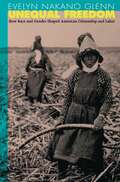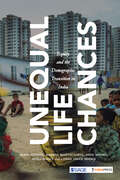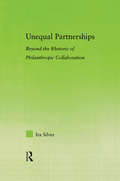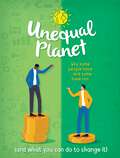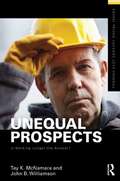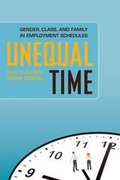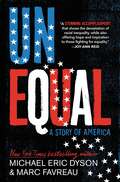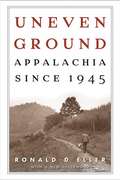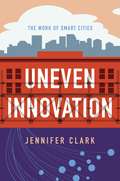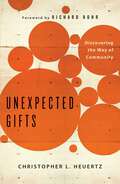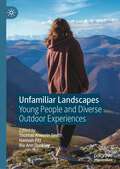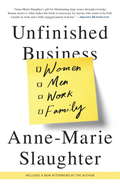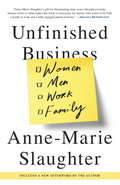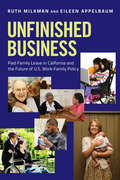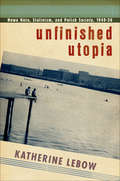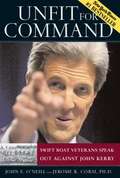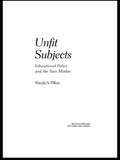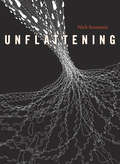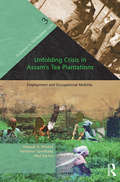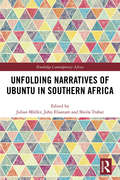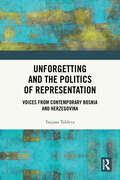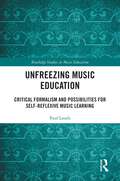- Table View
- List View
Unequal Freedom: How Race and Gender Shaped American Citizenship and Labor
by Evelyn Nakano GlennThe inequalities that persist in America have deep historical roots. Evelyn Nakano Glenn untangles this complex history in a unique comparative regional study from the end of Reconstruction to the eve of World War II. During this era the country experienced enormous social and economic changes with the abolition of slavery, rapid territorial expansion, and massive immigration, and struggled over the meaning of free labor and the essence of citizenship as people who previously had been excluded sought the promise of economic freedom and full political rights. After a lucid overview of the concepts of the free worker and the independent citizen at the national level, Glenn vividly details how race and gender issues framed the struggle over labor and citizenship rights at the local level between blacks and whites in the South, Mexicans and Anglos in the Southwest, and Asians and haoles (the white planter class) in Hawaii. She illuminates the complex interplay of local and national forces in American society and provides a dynamic view of how labor and citizenship were defined, enforced, and contested in a formative era for white-nonwhite relations in America.
Unequal Life Chances: Equity and the Demographic Transition in India
by Vivek Mishra Harsh Mander Anirban Bhattacharya Astha Singla Usman Jawed SiddiqiIndia is passing through a phase where a major share of its population is in its prime and of working age. Many have spoken of the ‘dividend’ that we could reap from what is being called the ‘youth bulge’. With the gaping inequalities in our society, the youth in this country encounter gross disparities in their life chances and in their opportunities to realise their potential. In this volume, we have attempted to look closely at India’s demographic transition, specifically from the perspective of social and economic equity. Other than covering the important elements of the debate on India’s demographic transition, the book attempts to makes a signal contribution in bringing together issues of social justice and economic inequality to bear on the mostly technocratic framing of the subject. Thus, it is an attempt to highlight that all decisions about economic ‘development’ or growth are politically infused and should be addressed as such.
Unequal Partnerships: Beyond the Rhetoric of Philanthropic Collaboration (New Approaches in Sociology)
by Ira SilverThrough an examination of the Chicago Initiative, Silver analyzes how elite philanthropists exercise social control over community organizations that do work in poor neighborhoods.
Unequal Planet: Why some people have - and some have not (and what you can do to change it)
by Anna ClaybourneUnequal Planet offers young readers a clear, insightful look at Earth's ongoing inequality crisis If everyone on Earth was equal, we would have the same standards of living, opportunities, wealth, health and other factors that make our lives different. But this isn't the case, the world is not an equal place and many experience great inequality in their lives. Unequal Planet looks at the reasons behind global inequality - from where people are born to their individual income to the impacts of climate change, and suggests some positive, practical solutions to this complex and challenging issue. It also explores what we can all do - at a global and an individual level - to help make the world a more equal and better place.Aimed at readers aged 9 and up.Contents:1: IT'S NOT FAIR! 2: WHAT IS MONEY? 3: WEALTH AND INCOME 4: RICH AND POOR COUNTRIES 5: NATURAL RESOURCES 6: LAND GRAB! 7: CASE STUDY: HAITI 8: DEALING WITH DEBT9: INVENTIONS AND TECHNOLOGY 10: CASE STUDY: NORWAY 11: INEQUALITY IN SOCIETY 12: MORE INEQUALITIES 13: CLIMATE CHANGE CRISIS 14: CASE STUDY: TORRES STRAIT ISLANDERS 15: CAN WE FIX IT? 16: INTERNATIONAL AID 17: EDUCATION AND KNOWLEDGE 18: CASE STUDY: EQUALITY FOR WOMEN 19: BIG IDEAS20: WHAT CAN YOU DO? 21: A FAIRER FUTURE?22: GLOSSARY 23: FURTHER READING 24: INDEX Titles in this series:Plastic PlanetHot PlanetRecycled PlanetSustainable PlanetExtinction PlanetPeaceful Planet
Unequal Prospects: Is Working Longer the Answer? (Framing 21st Century Social Issues)
by John Williamson Tay McNamaraIn light of the recent financial crisis and changing economic landscape, McNamara and Williamson present and analyze the possibility of working longer. Including a range of potential policies (e.g., further increasing the age of eligibility for full Social Security benefits, allocating more government resources to retraining and job search assistance for older workers), this is one of the major approaches currently being discussed by policy analysts inside and outside of the government. Emphasizing the role of inequalities and diversity among older adults, this book provides a framework for thinking about the advantages and disadvantages of working past the current retirement age. This book is for Sociology of Aging, Social Inequalities, and Social Problems courses.
Unequal Time: Gender, Class, and Family in Employment Schedules
by Dan Clawson Naomi GerstelLife is unpredictable. Control over one’s time is a crucial resource for managing that unpredictability, keeping a job, and raising a family. But the ability to control one’s time, much like one’s income, is determined to a significant degree by both gender and class. In Unequal Time, sociologists Dan Clawson and Naomi Gerstel explore the ways in which social inequalities permeate the workplace, shaping employees’ capacities to determine both their work schedules and home lives, and exacerbating differences between men and women, and the economically privileged and disadvantaged. Unequal Time investigates the interconnected schedules of four occupations in the health sector—professional-class doctors and nurses, and working-class EMTs and nursing assistants. While doctors and EMTs are predominantly men, nurses and nursing assistants are overwhelmingly women. In all four occupations, workers routinely confront schedule uncertainty, or unexpected events that interrupt, reduce, or extend work hours. Yet, Clawson and Gerstel show that members of these four occupations experience the effects of schedule uncertainty in very distinct ways, depending on both gender and class. But doctors, who are professional-class and largely male, have significant control over their schedules and tend to work long hours because they earn respect from their peers for doing so. By contrast, nursing assistants, who are primarily female and working-class, work demanding hours because they are most likely to be penalized for taking time off, no matter how valid the reasons. Unequal Time also shows that the degree of control that workers hold over their schedules can either reinforce or challenge conventional gender roles. Male doctors frequently work overtime and rely heavily on their wives and domestic workers to care for their families. Female nurses are more likely to handle the bulk of their family responsibilities, and use the control they have over their work schedules in order to dedicate more time to home life. Surprisingly, Clawson and Gerstel find that in the working class occupations, workers frequently undermine traditional gender roles, with male EMTs taking significant time from work for child care and women nursing assistants working extra hours to financially support their children and other relatives. Employers often underscore these disparities by allowing their upper-tier workers (doctors and nurses) the flexibility that enables their gender roles at home, including, for example, reshaping their workplaces in order to accommodate female nurses’ family obligations. Low-wage workers, on the other hand, are pressured to put their jobs before the unpredictable events they might face outside of work. Though we tend to consider personal and work scheduling an individual affair, Clawson and Gerstel present a provocative new case that time in the workplace also collective. A valuable resource for workers’ advocates and policymakers alike, Unequal Time exposes how social inequalities reverberate through a web of interconnected professional relationships and schedules, significantly shaping the lives of workers and their families.
Unequal: A Story of America
by Marc Favreau Michael Eric DysonFinalist for the YALSA Excellence in Nonfiction for Young Adults Award New York Times bestselling author Michael Eric Dyson and critically acclaimed author Marc Favreau show how racial inequality permeates every facet of American society, through the lens of those pushing for meaningful change The true story of racial inequality—and resistance to it—is the prologue to our present. You can see it in where we live, where we go to school, where we work, in our laws, and in our leadership. Unequal presents a gripping account of the struggles that shaped America and the insidiousness of racism, and demonstrates how inequality persists. As readers meet some of the many African American people who dared to fight for a more equal future, they will also discover a framework for addressing racial injustice in their own lives.
Uneven Ground: Appalachia Since 1945
by Ronald D EllerAppalachia has played a complex and often contradictory role in the unfolding of American history. Created by urban journalists in the years following the Civil War, the idea of Appalachia provided a counterpoint to emerging definitions of progress. Early-twentieth-century critics of modernity saw the region as a remnant of frontier life, a reflection of simpler times that should be preserved and protected. However, supporters of development and of the growth of material production, consumption, and technology decried what they perceived as the isolation and backwardness of the place and sought to "uplift" the mountain people through education and industrialization. <P><P>Ronald D Eller has worked with local leaders, state policymakers, and national planners to translate the lessons of private industrial-development history into public policy affecting the region. In Uneven Ground: Appalachia since 1945, Eller examines the politics of development in Appalachia since World War II with an eye toward exploring the idea of progress as it has evolved in modern America. Appalachia's struggle to overcome poverty, to live in harmony with the land, and to respect the diversity of cultures and the value of community is also an American story. In the end, Eller concludes, "Appalachia was not different from the rest of America; it was in fact a mirror of what the nation was becoming."
Uneven Innovation: The Work of Smart Cities
by Jennifer ClarkThe city of the future, we are told, is the smart city. By seamlessly integrating information and communication technologies into the provision and management of public services, such cities will enhance opportunity and bolster civic engagement. Smarter cities will bring in new revenue while saving money. They will be more of everything that a twenty-first century urban planner, citizen, and elected official wants: more efficient, more sustainable, and more inclusive. Is this true?In Uneven Innovation, Jennifer Clark considers the potential of these emerging technologies as well as their capacity to exacerbate existing inequalities and even produce new ones. She reframes the smart city concept within the trajectory of uneven development of cities and regions, as well as the long history of technocratic solutions to urban policy challenges. Clark argues that urban change driven by the technology sector is following the patterns that have previously led to imbalanced access, opportunities, and outcomes. The tech sector needs the city, yet it exploits and maintains unequal arrangements, embedding labor flexibility and precarity in the built environment. Technology development, Uneven Innovation contends, is the easy part; understanding the city and its governance, regulation, access, participation, and representation—all of which are complex and highly localized—is the real challenge. Clark’s critique leads to policy prescriptions that present a path toward an alternative future in which smart cities result in more equitable communities.
Unexpected Gifts: Discovering the Way of Community
by Christopher L HeuertzIn this heartfelt and thoughtful book, Christopher Heuertz writes of the dangers of isolation, the challenges we face when we join together and the struggles and joys that emerge from genuine community bonding.“Ironically, as much as we yearn for deep friendships and meaningful communities, many of us seem to be unable to find our way into them. Even if we know we’re made for community, finding one and staying there seems almost impossible. Though we hate to admit it, if we stay long enough in any relationship or set of friendships, we will experience failure, doubt, burnout, loneliness, transitions, a loss of self, betrayal, frustration, a sense of entitlement, grief, and weariness. Yet it’s these painful community experiences, these tensions we struggle to navigate, that hold surprising gifts.” —FROM THE PREFACE IN A STRIKINGLY confessional tone and vividly illustrated through story, Unexpected Gifts names eleven inevitable challenges that all friendships, relationships, and communities experience if they stay together long enough. Rather than allowing these challenges to become excuses to leave, Chris Heuertz suggests that things like betrayal, transitions, failure, loss of identity, entitlement, and doubt may actually be invitations to stay. And if we stay, these challenges can become unexpected gifts. *** Betrayal, failure, loss of identity, doubt. If your relationships have suffered from any of these pitfalls, this book will show you that staying together can create something more—even something beautiful. IN THIS HEARTFELT and thoughtful book, Christopher Heuertz writes of the dangers of isolation, the challenges we face when we join together, and the struggles and joys that emerge from genuine community bonding. Whether readers are forming a new community, searching for deeper community, or participating in a longtime community, they will find inspiration, caution, guidance, and encouragement as they discover the beauty of pressing in to the ambiguities of growing relationships in this tender and honest testimony about how we are woven together by grace.
Unfamiliar Landscapes: Young People and Diverse Outdoor Experiences
by Thomas Aneurin Smith Hannah Pitt Ria Ann DunkleyThis book critically interrogates how young people are introduced to landscapes through environmental education, outdoor recreation, and youth-led learning, drawing on diverse examples of green, blue, outdoor, or natural landscapes. Understanding the relationships between young people and unfamiliar landscapes is vital for young people’s current and future education and wellbeing, but how landscapes and young people are socially constructed as unfamiliar is controversial and contested. Young people are constructed as unfamiliar within certain landscapes along lines of race, gender or class: this book examines the cultures of outdoor learning that perpetuate exclusions and inclusions, and how unfamiliarity is encountered, experienced, constructed, and reproduced.This interdisciplinary text, drawing on Human Geography, Education, Leisure and Heritage Studies, and Anthropology, challenges commonly-held assumptions about how and why young people are educated in unfamiliar landscapes. Practice is at the heart of this book, which features three ‘conversations with practitioners’ who draw on their personal and professional experiences. The chapters are organised into five themes: (1) The unfamiliar outdoors; (2) The unfamiliar past; (3) Embodying difference in unfamiliar landscapes; (4) Being well, and being unfamiliar; and (5) Digital and sonic encounters with unfamiliarity. Educational practitioners, researchers and students will find this book essential for taking forward more inclusive outdoor and youth-led education.
Unfinished Business
by Anne-Marie SlaughterA powerful, persuasive, thought-provoking vision for how to finish the long struggle for equality between men and women, work and familyWhen Anne-Marie Slaughter accepted her dream job as the first female director of policy planning at the U.S. State Department in 2009, she was confident she could juggle the demands of her position in Washington, D.C., with the responsibilities of her family life in suburban New Jersey. Her husband and two young sons encouraged her to pursue the job; she had a tremendously supportive boss, Secretary of State Hillary Clinton; and she had been moving up on a high-profile career track since law school. But then life intervened. Parenting needs caused her to make a decision to leave the State Department and return to an academic career that gave her more time for her family.The reactions to her choice to leave Washington because of her kids led her to question the feminist narrative she grew up with. Her subsequent article for The Atlantic, "Why Women Still Can't Have It All," created a firestorm, sparked intense national debate, and became one of the most-read pieces in the magazine's history.Since that time, Anne-Marie Slaughter has pushed forward even further and broken free of her long-standing assumptions about work, life, and family. In the twenty-first century, the feminist movement has stalled, and though many solutions have been proposed for how women can continue to break the glass ceiling or rise above the "motherhood penalty," so far no solution has been able to unite all women.Now, in her refreshing and forthright voice, Anne-Marie Slaughter returns with her vision of what true equality between men and women really means and how we can get there. Slaughter takes a hard look at our reflexive beliefs--the "half-truths" we tell ourselves that are holding women back. Then she reveals the missing piece of the puzzle, a new focus that can reunite the women's movement and provide a common banner under which both men and women can advance and thrive.With moving personal stories, individual action plans, and a broad outline for change, Anne-Marie Slaughter presents a future in which all of us can finally finish the business of equality for women and men, work and family.
Unfinished Business
by Anne-Marie SlaughterA powerful, persuasive, thought-provoking vision for how to finish the long struggle for equality between men and women, work and family When Anne-Marie Slaughter accepted her dream job as the first female director of policy planning at the U.S. State Department in 2009, she was confident she could juggle the demands of her position in Washington, D.C., with the responsibilities of her family life in suburban New Jersey. Her husband and two young sons encouraged her to pursue the job; she had a tremendously supportive boss, Secretary of State Hillary Clinton; and she had been moving up on a high-profile career track since law school. But then life intervened. Parenting needs caused her to make a decision to leave the State Department and return to an academic career that gave her more time for her family. The reactions to her choice to leave Washington because of her kids led her to question the feminist narrative she grew up with. Her subsequent article for The Atlantic, "Why Women Still Can't Have It All," created a firestorm, sparked intense national debate, and became one of the most-read pieces in the magazine's history.Since that time, Anne-Marie Slaughter has pushed forward, breaking free of her long-standing assumptions about work, life, and family. Though many solutions have been proposed for how women can continue to break the glass ceiling or rise above the "motherhood penalty," women at the top and the bottom of the income scale are further and further apart. Now, in her refreshing and forthright voice, Anne-Marie Slaughter returns with her vision for what true equality between men and women really means, and how we can get there. She uncovers the missing piece of the puzzle, presenting a new focus that can reunite the women's movement and provide a common banner under which both men and women can advance and thrive. With moving personal stories, individual action plans, and a broad outline for change, Anne-Marie Slaughter reveals a future in which all of us can finally finish the business of equality for women and men, work and family.
Unfinished Business
by Ruth Milkman Eileen AppelbaumUnfinished Business documents the history and impact of California's paid family leave program, the first of its kind in the United States, which began in 2004. Drawing on original data from fieldwork and surveys of employers, workers, and the larger California adult population, Ruth Milkman and Eileen Appelbaum analyze in detail the effect of the state's landmark paid family leave on employers and workers. They also explore the implications of California's decade-long experience with paid family leave for the nation, which is engaged in ongoing debate about work-family policies. Milkman and Appelbaum recount the process by which California workers and their allies built a coalition to win passage of paid family leave in the state legislature, and lay out the lessons for advocates in other states and localities, as well as the nation. Because paid leave enjoys extensive popular support across the political spectrum, campaigns for such laws have an excellent chance of success if some basic preconditions are met. Do paid family leave and similar programs impose significant costs and burdens on employers? Business interests argue that they do and routinely oppose any and all legislative initiatives in this area. Once the program took effect in California, this book shows, large majorities of employers themselves reported that its impact on productivity, profitability, and performance was negligible or positive. Unfinished Business demonstrates that the California program is well managed and easy to access, but that awareness of its existence remains limited. Moreover, those who need the program's benefits most urgently--low-wage workers, young workers, immigrants, and disadvantaged minorities--are least likely to know about it. As a result, the long-standing pattern of inequality in access to paid leave has remained largely intact.
Unfinished Nature: Particle Physics at CERN
by Arpita RoyThe discovery of the Higgs boson in 2012, the culmination of a decades-long search, is one of the singular triumphs of particle physics. Advanced experiments at the Large Hadron Collider at CERN (the Conseil Européen pour la Recherche Nucléaire) near Geneva detected the long-hypothesized particle, resulting in the 2013 Nobel Prize in Physics. Drawing on two and a half years of in-depth fieldwork spent among CERN’s research community during this critical period, Arpita Roy offers a rich analysis of science in the making.To what extent are scientific discoveries a matter of empirical findings? How do scientists at the farthest reach of abstraction understand their work? Unfinished Nature delves deep into this particle physics laboratory to distinguish the modes of reasoning that animate scientific discoveries and innovations. Demonstrating a deep knowledge of both contemporary physics and the methods of qualitative social science, Roy considers what scientists have to say about their commitments and concerns, the sources and vision guiding their experiments, and the questions they ask of themselves and others. In so doing, she argues that finding new facts in experimental physics turns on conceptual leaps, not necessarily empirical results. A sophisticated interdisciplinary ethnography of a scientific community, Unfinished Nature offers provocative insights into the nature and production of scientific knowledge.
Unfinished Utopia: Nowa Huta, Stalinism, and Polish Society, 1949–56
by Katherine LebowUnfinished Utopia is a social and cultural history of Nowa Huta, dubbed Poland's "first socialist city" by Communist propaganda of the 1950s. Work began on the new town, located on the banks of the Vistula River just a few miles from the historic city of Kraków, in 1949. By contrast to its older neighbor, Nowa Huta was intended to model a new kind of socialist modernity and to be peopled with "new men," themselves both the builders and the beneficiaries of this project of socialist construction. Nowa Huta was the largest and politically most significant of the socialist cities built in East Central Europe after World War II; home to the massive Lenin Steelworks, it epitomized the Stalinist program of forced industrialization that opened the cities to rural migrants and sought fundamentally to transform the structures of Polish society.Focusing on Nowa Huta's construction and steel workers, youth brigade volunteers, housewives, activists, and architects, Katherine Lebow explores their various encounters with the ideology and practice of Stalinist mobilization by seeking out their voices in memoirs, oral history interviews, and archival records, juxtaposing these against both the official and unofficial transcripts of Stalinism. Far from the gray and regimented landscape we imagine Stalinism to have been, the fledgling city was a colorful and anarchic place where the formerly disenfranchised (peasants, youth, women) hastened to assert their leading role in "building socialism"-but rarely in ways that authorities had anticipated.
Unfit For Command: Swift Boat Veterans Speak Out Against John Kerry
by Jerome R. Corsi John E. O'NeillJohn O'Neill was the naval officer who took over John Kerry's Swift Boat in the muddy waters of Vietnam. What he learned convinced him - and convinced the majority of veterans who served directly with Kerry - that John Kerry was and is unfit for command as a naval officer, let alone as commander in chief of the United States. In this stunning new book, John O'Neill and his coauthor Dr. Jerome Corsi (an expert on the anti-Vietnam War movement) interviewed dozens of veterans who served with Kerry and meticulously documented a shameful record of betrayal and deception on the part of John Kerry. In Unfit for Command you'll learn: How two of John Kerry's three Purple Heart decorations resulted from self-inflicted wounds, not suffered under enemy fire Why John Kerry's third Purple Heart "fanny wound" was the highlight of his much touted "no man left behind" Bronze Star How John Kerry turned the tragic death of a father and small child in a Vietnamese fishing boat into an act of "heroism" by filing a false report on the incident How John Kerry entered an abandoned Vietnamese village, slaughtered the domestic animals owned by the civilians, and burned down their homes with his Zippo lighter How John Kerry's reckless behavior convinced his colleagues that he had to go - becoming the only Swift Boat veteran to serve only four months in Vietnam How, as a leader of Vietnam Veterans Against the War, John Kerry attended a meeting where plans were discussed to assassinate prominent United States senators who supported the war How Kerry met secretly with Communist delegates at the Paris Peace Conference during the Vietnam War, and why some believe he violated the Uniform Code of Military Justice and federal law Based on detailed interviews with Swift Boat veterans who served in Vietnam with John Kerry and on recently released FBI surveillance reports of John Kerry's antiwar activities, Unfit for Command is a shocking indictment of a politician who slandered his fellow veterans, danced on the edge of treason, and has shamelessly exaggerated his own war service for political ends.
Unfit Subjects: Education Policy and the Teen Mother, 1972-2002
by Wanda S. PillowWanda Pillow presents a critical analysis of federal law and polciy towards pregnant teens, representations of teen pregnancy in popular culture and educational policy assesses how schools provide educational opportunities for school aged mothers. Through in- depth analysis of specific policies and programmes, both past and present, thsi book traces America's successes and failures in educating pregnant teens. Unfit Subjects uses feminist, race and poststructural theories to inform a satisfactory educational policy.
Unflattening
by Nick SousanisThe primacy of words over images has deep roots in Western culture. But what if the two are inextricably linked in meaning-making? In this experiment in visual thinking, drawn in comics, Nick Sousanis defies conventional discourse to offer readers a stunning work of graphic art and a serious inquiry into the ways humans construct knowledge.
Unfolding Crisis in Assam's Tea Plantations: Employment and Occupational Mobility (Transition in Northeastern India)
by Atul Sarma Deepak K. Mishra Vandana UpadhyayAs the Indian economy integrates into global circuits of production, exchange and accumulation, the burdens of adjustment are shared unequally by different sectors, classes and regions. This study unravels the livelihood strategies and living conditions of labour in the tea gardens of Assam. The tea sector has been undergoing a crisis since the 1990s, with stagnant production, decline in exports, and closures of many tea gardens leading to large-scale retrenchments in the labour force. Based on a detailed analysis of secondary data and primary field research, the study examines the extent, types and implications of inter-generational occupational mobility (or immobility) among tea garden labourers in Assam. In the process, it reflects on how even a sector that had brought capital and labour from outside and contributed significantly to the country’s export earnings failed to create dynamic growth linkages within the local economy. The experience of the labour force in the Assam tea sector, the authors argue, is important for making sense not only of the development dynamics of the region, but of the contradictory ways in which forces of globalisation and neo-liberal reforms have been reshaping the worlds of labourers in the margins. The book will be of interest to students and scholars of labour studies, development studies, management studies, and studies of north-east India, as well as to policy-makers and those in the tea industry.
Unfolding Narratives of Ubuntu in Southern Africa (Routledge Contemporary Africa)
by Julian Müller John Eliastam Sheila TraharUbuntu is the African idea of personhood: persons depend on other persons in order to be. This is summarised in the expression: umuntu ngumuntu ngabantu, that is, a person is a person through persons. This edited collection illustrates the power of fictionalised representation in reporting research conducted on Ubuntu in Southern Africa. The chapters insert the concept of Ubuntu within the broad intellectual debate of self and community, to demonstrate its intellectual and philosophical value and theoretical grounding in known practices emanating from the African continent, and indeed how it works to unsettle some of our received notions of the self.
Unforbidden Pleasures
by Adam PhillipsMuch has been written of the forbidden pleasures. But what of the "unforbidden" pleasures?Unforbidden Pleasures is the singular new book from Adam Phillips, the author of Missing Out, Going Sane, and On Balance. Here, with his signature insight and erudition, Phillips takes Oscar Wilde as a springboard for a deep dive into the meanings and importance of the unforbidden, from the fall of our "first parents," Adam and Eve, to the work of the great psychoanalytic thinkers. Forbidden pleasures, he argues, are the ones we tend to think about, yet when you look into it, it is probable that we get as much pleasure, if not more, from unforbidden pleasures than from those that are taboo. And we may have underestimated just how restricted our restrictiveness, in thrall to the forbidden and its rules, may make us. An ambitious book that speaks to the precariousness of modern life, Unforbidden Pleasures explores the philosophical, psychological, and social dynamics that govern human desire and shape our everyday reality.
Unforgetting and the Politics of Representation: Voices from Contemporary Bosnia and Herzegovina
by Tatjana TakševaBased on interviews and conversations in the Bosnian Federation with women survivors of war rape, children born of rape and armed conflict, leaders of NGOs who work with survivors, and people who lived through the war and who experienced it in different ways, this book challenges one dimensional representations of the Yugoslav war and subsequent peacebuilding processes. Relying on feminist ethnography and autoethnography, this volume offers systematic engagement with the politics of representation of Bosnia and survivors of war in post-war journalism and scholarship.Through rich and varied individual experiences of wartime violence and recovery that go beyond simple ‘us’ versus ‘them’ narratives of ethnic identity and intolerance, the book shows how public and private, individual and collective discourses actively shape one another and contribute to complex forms of engagement in recovery, healing and rebuilding. The author draws upon archival material to undermine the fetishization of ethnicity as a determining category that often underpins journalistic and scholarly accounts of post-war Bosnia. By retracing and repairing separations between individual and collective remembrance, and by complicating linear and monolithic conception of this process, the narratives in the book actively contest reductionist and instrumentalist accounts of the civil war in Bosnia.The book will appeal to scholars across the social sciences with interest in memory, peacebuilding, national identity, gendered violence and processes of reconciliation
Unfree Labor: American Slavery and Russian Serfdom
by Peter KolchinTwo massive systems of unfree labor arose, a world apart from each other, in the late sixteenth and early seventeenth centuries. The American enslavement of blacks and the Russian subjection of serfs flourished in different ways and varying degrees until they were legally abolished in the mid-nineteenth century. Historian Peter Kolchin compares and contrasts the two systems over time in this magisterial book, which clarifies the organization, structure, and dynamics of both social entities, highlighting their basic similarities while pointing out important differences discernible only in comparative perspective. These differences involved both the masters and the bondsmen. The independence and resident mentality of American slaveholders facilitated the emergence of a vigorous crusade to defend slavery from outside attack, whereas an absentee orientation and dependence on the central government rendered serfholders unable successfully to defend serfdom. Russian serfs, who generally lived on larger holdings than American slaves and faced less immediate interference in their everyday lives, found it easier to assert their communal autonomy but showed relatively little solidarity with peasants outside their own villages; American slaves, by contrast, were both more individualistic and more able to identify with all other blacks, both slave and free. Kolchin has discovered apparently universal features in master–bondsman relations, a central focus of his study, but he also shows their basic differences as he compares slave and serf life and chronicles patterns of resistance. If the masters had the upper hand, the slaves and serfs played major roles in shaping, and setting limits to, their own bondage. This truly unprecedented comparative work will fascinate historians, sociologists, and all social scientists, particularly those with an interest in comparative history and studies in slavery.
Unfreezing Music Education: Critical Formalism and Possibilities for Self-Reflexive Music Learning (Routledge Studies in Music Education)
by Paul LouthUnfreezing Music Education argues that discussing the conflicting meanings of music should occupy a more central role in formal music education and music teacher preparation programs than is currently the case. Drawing on the critical theory of the Frankfurt School, the author seeks to take a dialectical approach to musical meaning, rooted in critical formalism, that avoids the pitfalls of both traditional aesthetic arguments and radical subjectivity. This book makes the case for helping students understand that the meaning of musical forms is socially constructed through a process of reification, and argues that encouraging greater awareness of the processes through which music’s fluid meanings become hidden will help students to think more critically about music. Connecting this philosophical argument with concrete, practical challenges faced by students and educators, this study will be of interest to researchers across music education and philosophy, as well as post-secondary music educators and all others interested in aesthetic philosophy, critical theory, cultural studies, or the sociology of music and music education.
